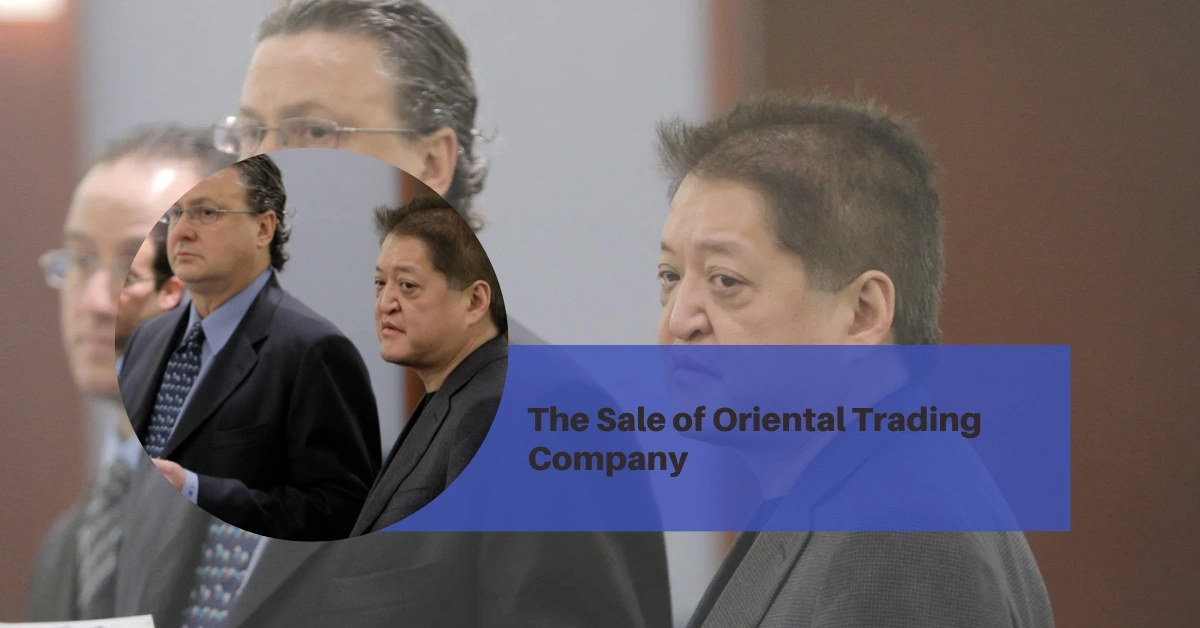Many people searching “what is Terry Watanabe’s net worth” expect to find the story of a wealthy businessman. What they find instead is one of the most dramatic financial collapses in modern American history.
Terrance Watanabe built a $500 million fortune running one of the country’s largest party supply companies. Then he lost most of it at the casino tables of Las Vegas in a single year. His story is a study in how quickly wealth can disappear.
Who Was Terrance Watanabe?
Watanabe was born into a business family in Omaha, Nebraska. His father, Harry Watanabe, founded Oriental Trading Company in 1932 as a small gift shop selling carnival trinkets and party favors.
Terrance took over the company at just 20 years old. Under his leadership, the business moved from retail stores to a national mail-order model, shipping affordable party supplies and novelty items directly to customers across the country.
By the late 1990s, Oriental Trading Company was generating around $300 million in annual revenue. Watanabe had built it into one of the largest party supply distributors in the nation.
How He Built His $500 Million Fortune
Watanabe’s strategy was straightforward. He focused on high-volume sales with modest margins, importing affordable goods and keeping overhead low.
The company’s catalogs became familiar to schools, churches, and event planners across America. Thousands of low-cost items at competitive prices built a loyal customer base over decades.
His personal wealth grew alongside the business. By the time he stepped away, his net worth had reached approximately $500 million, a figure built over 23 years of steady growth.

\Source: https://www.fortune.com/
The Sale That Changed Everything
In 2000, Watanabe sold his stake in Oriental Trading Company to Brentwood Associates, a Los Angeles-based private equity firm. The sale gave him substantial liquidity, estimated in the hundreds of millions of dollars.
He stepped away from the business world entirely. He planned to focus on philanthropy and personal enjoyment after more than two decades running a major company.
That transition, however, left him without structure or direction. It also left him with more cash than purpose, a combination that proved dangerous.
Oriental Trading Company continued changing hands after his departure. The Carlyle Group acquired a majority stake in 2006. The company filed for Chapter 11 bankruptcy in 2010, and Warren Buffett’s Berkshire Hathaway purchased it in 2012, where it remains today.
When the Gambling Started
Watanabe’s gambling began modestly at Harrah’s Council Bluffs, a casino near his Omaha home. By 2005, he had escalated to the high-stakes environment of the Las Vegas Strip.
He favored games with poor odds for players: blackjack, roulette, and slot machines. Reports indicate he often gambled while intoxicated, sometimes playing for 24 consecutive hours.
Casinos took notice. He achieved “Chairman” tier status in the Caesars Rewards program, earning private jets, concert tickets, personal attendants, and luxury suites. These perks kept him at the tables even as his losses mounted.
The Largest Gambling Loss in Las Vegas History
In 2007, Watanabe wagered an estimated $825 million across Caesars Palace and Rio Casino. He lost approximately $204 million that year, the largest single-year gambling loss by an individual in Las Vegas history.
At his worst, he was losing up to $5 million per day. He would sometimes play three $50,000 blackjack hands simultaneously while placing bets on a nearby roulette table.
His losses were so significant that they accounted for roughly 5.6% of Harrah’s total annual Las Vegas gambling revenue that year, according to legal documents. No other individual gambler had ever contributed such a large share to a major casino’s income.
Casinos offered him a 15% cashback on losses, $12,500 monthly in airfare credits, complimentary suites, personal staff, and a $500,000 gift shop credit. These arrangements continued even as his fortune collapsed.
Legal Battles With the Casino
By 2009, Watanabe had repaid around $112 million of his debt but refused to cover the remaining $14.7 million owed to Harrah’s Entertainment. The casino responded with felony fraud and theft charges related to bad checks.
Watanabe countered with serious allegations of his own. He claimed Caesars Palace and Rio Casino had deliberately kept him gambling by providing unlimited alcohol and prescription drugs while he was visibly impaired, in violation of Nevada gaming regulations.
The New Jersey Gaming Commission later fined Caesars Entertainment $225,000 for allowing Watanabe to gamble while heavily intoxicated. That regulatory action gave weight to his claims.
In July 2010, both parties reached a confidential settlement. The criminal charges against Watanabe were dropped, and both sides withdrew their civil claims.
What Is Terry Watanabe’s Net Worth Today?
So what is Terry Watanabe’s net worth now? The answer is a stark contrast to his peak of $500 million.
In 2008, he sold his Omaha mansion for $2.66 million to cover expenses. In 2017, he launched a GoFundMe campaign to help pay for prostate cancer treatment, an indication of how far his finances had fallen.
Financial experts suggest his current net worth is negligible compared to his former wealth. The journey from $500 million to needing public help with medical bills took less than a decade.
Gambling losses are generally tax-deductible only to the extent of gambling winnings in the same year. With losses vastly outpacing winnings, Watanabe likely faced significant tax obligations with little relief.
Recovery and Life After the Casino
Watanabe’s family staged an intervention in late 2007. He entered a residential rehabilitation program and, according to reports, has not gambled since.
He relocated from Omaha to San Francisco, putting distance between himself and familiar environments. His post-gambling years have been shaped by health challenges and a much lower public profile.
In 2022, Foundation Media Partners acquired the rights to his life story with plans for a film, book, and documentary. Those projects will bring renewed attention to his experiences and the questions they raise about casino practices toward problem gamblers.
The Lessons His Story Leaves Behind
Watanabe’s story raises a real question about what casinos owe their highest-spending customers. Providing alcohol, extending credit, and offering luxury perks to a visibly impaired gambler contributed directly to a $204 million loss.
The $225,000 fine levied by the New Jersey Gaming Commission was a fraction of what the casino earned from Watanabe’s play. Critics argue that the incentives for casinos to protect problem gamblers remain weak.
For Watanabe personally, his story shows how quickly wealth without purpose can become a liability. He left a successful business career with hundreds of millions of dollars and nothing left to build. Within seven years, most of it was gone.
His name still appears in Las Vegas record books. His life story now moves toward film and documentary. And the answer to “what is Terry Watanabe’s net worth today” remains a cautionary reminder of how fast a fortune can disappear.

